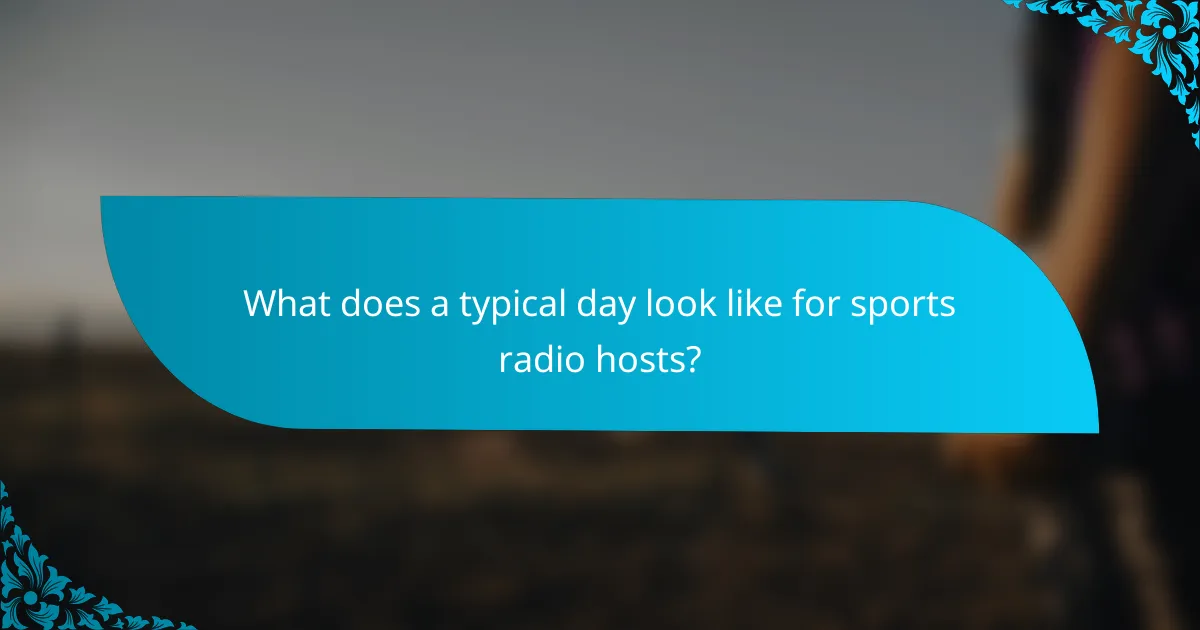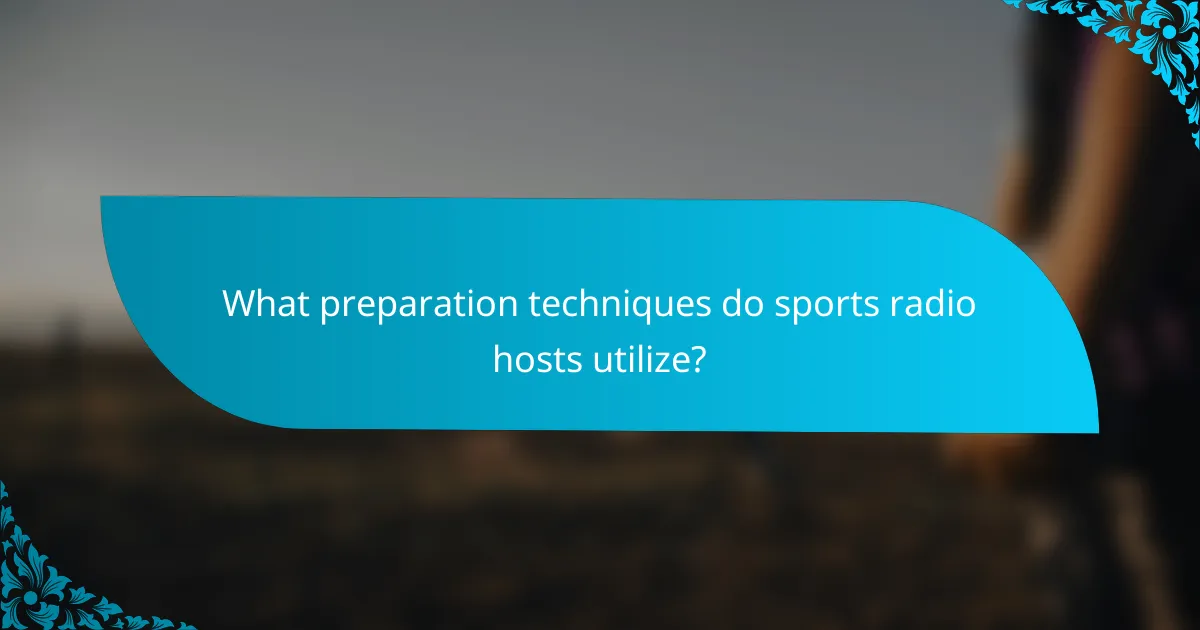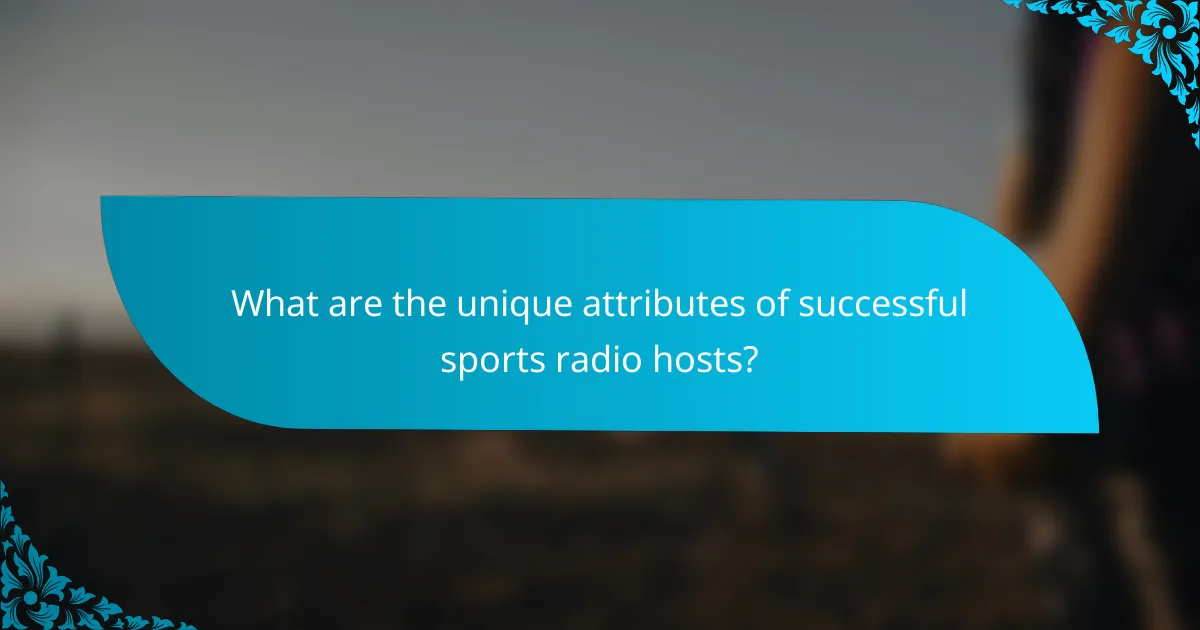Sports radio hosts are professionals who engage audiences through live broadcasts, discussions, and interviews about various sports topics. Their daily routines involve early preparation, including reviewing sports news, researching relevant statistics, and conducting interviews. During broadcasts, they actively engage with listeners while navigating real-time discussions. Successful hosts possess strong communication skills, deep sports knowledge, charisma, and adaptability, which enhance audience connection and content delivery. The article explores the daily practices, preparation techniques, and challenges faced by sports radio hosts in maintaining audience engagement and ensuring relevant content.

What does a typical day look like for sports radio hosts?
A typical day for sports radio hosts involves preparation, broadcasting, and post-show activities. They usually start their day early, reviewing sports news and updates. Hosts often research topics and gather statistics for upcoming segments. They may conduct interviews with athletes or analysts before going on air. During the broadcast, they engage with listeners and discuss various sports topics. After the show, hosts often analyze listener feedback and plan for future episodes. This routine helps maintain audience engagement and ensures relevant content.
How do sports radio hosts prepare for their shows?
Sports radio hosts prepare for their shows by conducting thorough research on current sports topics. They review recent game statistics, player performances, and news updates. Hosts often create outlines or scripts to structure their discussions. They may also engage in pre-show meetings with producers to align on key segments. Additionally, hosts listen to previous shows for self-evaluation and improvement. This preparation helps ensure that they provide accurate and engaging content. According to a study by the National Association of Broadcasters, effective preparation increases listener engagement and retention.
What are the essential tasks in a sports radio host’s morning routine?
A sports radio host’s morning routine includes several essential tasks. First, they review sports news and updates to stay informed. This involves checking scores, player injuries, and team changes. Next, they prepare show content by outlining topics and segments. This preparation ensures a structured flow during the broadcast. Additionally, they practice delivery and timing to enhance on-air performance. Engaging with listeners on social media is also crucial for audience interaction. Finally, they conduct sound checks to ensure equipment functionality. These tasks collectively create a well-prepared and engaging show.
How do hosts stay updated on sports news and events?
Hosts stay updated on sports news and events through multiple sources. They often rely on sports news websites for real-time updates. Social media platforms provide instant information and reactions. Many hosts subscribe to newsletters from reputable sports analysts. They also watch live games and highlights for firsthand insights. Networking with industry professionals helps them gain exclusive information. Regularly listening to other sports shows can provide additional perspectives. Utilizing sports apps allows for quick access to scores and news. Staying informed is crucial for engaging discussions on-air.
What challenges do sports radio hosts face daily?
Sports radio hosts face multiple challenges daily. They must consistently create engaging and relevant content. This requires staying updated on sports news and trends. Hosts also deal with time constraints during live broadcasts. They need to manage caller interactions and listener expectations effectively. Technical issues can arise unexpectedly, disrupting the broadcast. Additionally, maintaining audience engagement in a competitive market is crucial. Hosts often face pressure to deliver unique perspectives and insights. Balancing personal opinions with professional neutrality can also be challenging.
How do hosts manage time constraints during live broadcasts?
Hosts manage time constraints during live broadcasts by using strict timing cues and segment planning. They often outline their shows with predetermined time limits for each segment. This helps ensure that the broadcast stays on schedule. Hosts also rely on timers or producers to provide real-time feedback on time remaining. Additionally, they practice concise communication to convey information quickly. This approach minimizes delays and keeps the audience engaged. Effective time management is crucial in maintaining the flow of the broadcast. Research indicates that structured segments improve listener retention and satisfaction.
What are common technical difficulties encountered by sports radio hosts?
Common technical difficulties encountered by sports radio hosts include equipment malfunctions, audio quality issues, and connectivity problems. Equipment malfunctions can involve microphones, mixers, or broadcasting software failing during a live show. Audio quality issues often arise from background noise or poor sound mixing, affecting listener experience. Connectivity problems may stem from internet outages or weak signals, disrupting broadcasts. These challenges can lead to interruptions and affect the overall professionalism of the show.

What preparation techniques do sports radio hosts utilize?
Sports radio hosts utilize various preparation techniques to deliver engaging content. They conduct extensive research on current sports events and trends. This includes analyzing statistics, player performance, and team dynamics. Hosts often prepare show outlines to structure their segments effectively. They may also listen to previous broadcasts for improvement. Networking with sports professionals can provide insider insights. Additionally, practicing delivery helps enhance on-air performance. These techniques contribute to informed discussions and audience engagement.
How do hosts research topics for their shows?
Hosts research topics for their shows by utilizing various methods. They often begin with audience feedback to gauge interests. They analyze current sports news and trends for relevant content. Hosts also consult expert opinions and interviews for deeper insights. Additionally, they review statistics and historical data to support discussions. Networking with industry insiders can provide exclusive information. They may also use social media to identify popular topics. This multifaceted approach ensures that the content remains engaging and informative.
What resources do sports radio hosts rely on for accurate information?
Sports radio hosts rely on a variety of resources for accurate information. They use official team websites for up-to-date statistics and news. Sports news outlets provide breaking news and in-depth analysis. Social media platforms offer real-time updates from players and teams. Industry databases supply historical data and player performance metrics. Interviews with coaches and athletes yield firsthand insights. Additionally, analytics tools assist in interpreting game statistics. These resources ensure hosts deliver reliable and timely content to their audience.
How do hosts select guests and interviewees for their programs?
Hosts select guests and interviewees based on relevance to the program’s theme. They consider the guest’s expertise and experience in the subject matter. Hosts also evaluate the guest’s ability to engage with the audience. They may prioritize guests with a strong public presence or following. Researching potential guests often involves reviewing their previous interviews and media appearances. Hosts aim to create diverse perspectives within their programming. They also take into account current events and trending topics. This selection process ensures that the content remains fresh and engaging for listeners.
What role does audience engagement play in preparation?
Audience engagement plays a critical role in preparation for sports radio hosts. It shapes the content and direction of their shows. Engaging with the audience helps hosts understand listener preferences and interests. This feedback can inform topic selection and discussion points. Active audience engagement can also enhance show relevance and relatability. Hosts often use social media and listener polls to gauge opinions. This interaction leads to more dynamic and responsive programming. Engaging the audience fosters a sense of community and loyalty. Ultimately, it impacts the overall success and effectiveness of the broadcast.
How do hosts interact with their audience before the show?
Hosts interact with their audience before the show primarily through social media and live events. They often use platforms like Twitter and Instagram to engage listeners. Hosts may share behind-the-scenes content to build excitement. They might also ask for audience questions or topics to discuss. This interaction helps create a sense of community. Additionally, hosts may attend public events or meet-and-greet sessions. These opportunities allow for direct engagement with fans. Such interactions can increase listener loyalty and interest in the show.
What strategies do hosts use to incorporate listener feedback?
Hosts use several strategies to incorporate listener feedback effectively. They often conduct surveys to gather specific listener opinions. This method allows hosts to understand audience preferences and interests. Another strategy is to engage with listeners on social media platforms. Hosts can respond to comments and questions in real-time, fostering a sense of community. Additionally, hosts may dedicate segments of their shows to discuss listener feedback. This approach validates audience input and encourages further interaction. Some hosts also analyze call-in data to identify popular topics. By reviewing listener metrics, they can tailor content to audience demands. These strategies ensure that hosts remain connected with their audience and adapt their content accordingly.

What are the unique attributes of successful sports radio hosts?
Successful sports radio hosts possess unique attributes that set them apart in the industry. They exhibit strong communication skills, allowing them to engage listeners effectively. Their deep knowledge of sports enables them to provide insightful commentary. Charisma is another key trait, as it helps them connect with their audience on a personal level. Adaptability is crucial, as they must handle unexpected situations during live broadcasts. Strong interviewing skills allow them to extract valuable insights from guests. They also demonstrate a passion for sports, which resonates with their audience. Additionally, successful hosts are skilled in storytelling, making their content relatable and entertaining. Finally, they maintain a strong online presence, engaging with fans through social media platforms.
What skills are essential for sports radio hosting?
Essential skills for sports radio hosting include strong communication abilities, deep sports knowledge, and engaging personality. Communication skills are crucial for conveying information clearly and effectively. Hosts must articulate thoughts and ideas in a way that resonates with listeners. A thorough understanding of various sports enhances credibility and allows for insightful commentary. An engaging personality helps to connect with the audience, making the show more enjoyable. Additionally, adaptability is important for handling live situations and unexpected changes. Strong interviewing skills enable hosts to conduct compelling discussions with guests. Overall, these skills combined create a successful sports radio host.
How do communication skills impact a host’s effectiveness?
Communication skills significantly impact a host’s effectiveness by enhancing audience engagement. Effective communication allows hosts to articulate ideas clearly and connect with listeners. This connection fosters trust and loyalty among the audience. Additionally, strong verbal skills enable hosts to convey enthusiasm and passion, making content more appealing. Research indicates that hosts with excellent communication abilities can boost listener retention rates. For instance, a study by the Nielsen Company found that engaging hosts can increase audience ratings by up to 30%. Thus, communication skills are vital for a host’s success in sports radio.
What role does personality play in connecting with the audience?
Personality plays a crucial role in connecting with the audience. It shapes how hosts engage listeners and convey messages. A relatable personality fosters trust and loyalty among the audience. Hosts with authentic and engaging personalities create a sense of community. This connection enhances listener retention and encourages audience participation. Research shows that personality traits like warmth and enthusiasm significantly impact audience connection. For example, a study by the Journal of Broadcasting & Electronic Media found that charismatic hosts attract larger audiences. Thus, personality is essential for effective communication in sports radio.
How do sports radio hosts handle unexpected challenges?
Sports radio hosts handle unexpected challenges by remaining adaptable and quick-thinking. They often prepare for potential disruptions by having backup content ready. This may include pre-recorded segments or interviews. Hosts also rely on their deep knowledge of sports to fill airtime effectively. When technical issues arise, they communicate transparently with their audience. Engaging listeners through social media can help maintain interaction. This adaptability is crucial, as live broadcasting often presents unforeseen events. Many hosts have reported that experience aids in managing these situations smoothly.
What techniques do hosts use to stay composed during live errors?
Hosts use several techniques to stay composed during live errors. They often practice deep breathing to manage anxiety. This technique helps regulate their heart rate and maintain focus. Additionally, hosts may rely on pre-prepared scripts or notes to regain their footing. Having a clear outline assists in quickly redirecting the conversation. Some hosts employ humor to diffuse tension, making the situation more relatable to listeners. This approach can lighten the mood and shift attention away from the error. Furthermore, hosts frequently engage in active listening. This allows them to respond appropriately to unexpected developments. Finally, maintaining a positive mindset is crucial. Acknowledging that mistakes happen can help hosts recover gracefully. These techniques collectively support hosts in managing live errors effectively.
How can hosts adapt their content on short notice?
Hosts can adapt their content on short notice by utilizing real-time information and audience engagement. They can monitor breaking news or trending topics relevant to their audience. This allows them to pivot their planned segments quickly. Hosts can also rely on social media for immediate feedback and suggestions from listeners. Engaging with the audience helps tailor content to current interests. Additionally, having a flexible outline or backup topics prepared can facilitate quick adjustments. This adaptability is crucial in the fast-paced environment of sports radio.
What best practices can aspiring sports radio hosts follow?
Aspiring sports radio hosts should focus on developing strong communication skills. Clear articulation and engaging storytelling are essential for captivating an audience. Regularly practicing on-air delivery helps improve confidence and fluency. Researching current sports events and trends is crucial for informed discussions. Hosts should also engage with their audience through social media to build a loyal listener base. Networking with industry professionals can provide valuable insights and opportunities. Lastly, staying adaptable to changing formats and technologies is important for long-term success in the field.
The main entity of the article is sports radio hosts, focusing on their daily routines, preparation techniques, and the challenges they encounter. The article outlines a typical day for these hosts, including their morning routines involving news reviews, content preparation, and audience engagement strategies. It discusses essential tasks such as researching topics, managing time constraints during live broadcasts, and handling technical difficulties. Additionally, it highlights the unique attributes and skills necessary for successful sports radio hosting, emphasizing the importance of communication, adaptability, and audience interaction in maintaining listener engagement.
